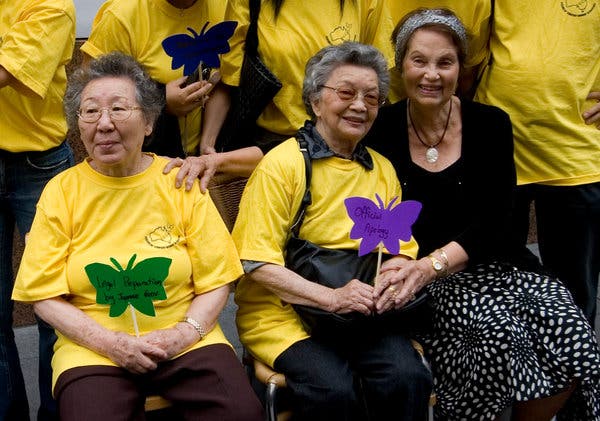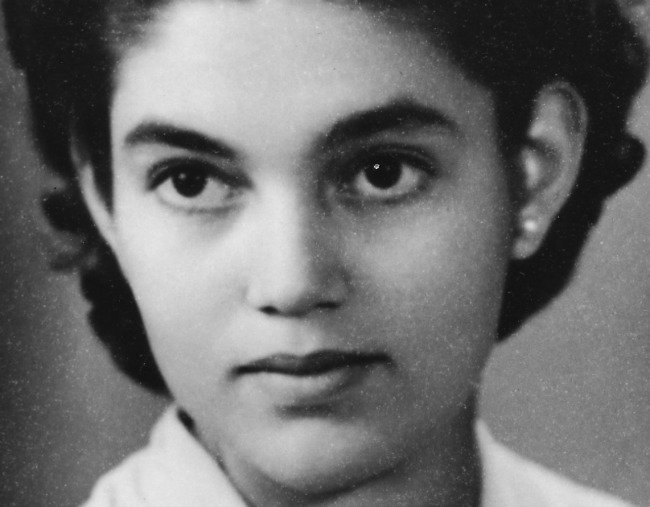Content warning: violence, sexual assault
Sitting in the Australian War Memorial, a small white handkerchief signed by seven women and dated 26 February 1944, silently holds testament to a crime which for decades remained omitted from the public memory of WWII. It belonged to Australian, Jan Ruff-O’Herne; 21 years old when she signed her own name, who had dreamed of becoming a nun once the war was over.
Jan passed away on 19 August last year at 96. She was a great-grandmother who after the war, made a life for herself in Australia, with a loving husband who knew what she had survived. But despite the happiness she later found, Jan lived carrying the physical and mental trauma of an unfathomable human rights abuse which she – and as many as 200,000 other women across Asia between 1932–1945, had been victim to at the hands of the Imperial Japanese Army (IJA).

Jan Ruff O’Herne
Following the Japanese invasion of Java, Indonesia, in March 1942, Jan had been interned with her mother and sister at a women’s civilian prison camp for two years, until the day when all the women aged 17 to 21 were ordered to line up for inspection – the date was 26 February 1944. Unaware of their fate, sixteen women were chosen and separated from their families – seven of whom, were taken to an abandoned colonial house known as ‘The House of the Seven Seas’, where for three months they were systematically beaten and raped.
As the war was reaching cessation, the terrified young women were later returned to their families at a separate camp. They were threatened by officers that if any of them ever spoke about what had happened, they would be killed as well as their loved ones; and the other prisoners despised them, as they assumed these women had been voluntary sex workers in order to be rewarded with more food. They would finally be liberated by allied forces on 15 August 1945.
For fifty years, Jan lived silently tortured by the memories of those three months – incapable of speaking about it and too ashamed to tell even her two grown daughters. Yet she held onto the handkerchief; carefully embroidering over the writing and considering it one of her ‘dearest possessions’, despite her fear that her family would find it and ask what it meant.
Had it not been for the bravery of former Korean ‘comfort women’, stepping forward in the early 1990s and campaigning for an official apology from the Japanese government, Jan may never have shared her story.
It was 1992 when Jan first saw coverage of Korean victims courageously fighting for recognition and publicly sharing their harrowing experiences. Hearing their testimonies and sharing their anger at being officially referred to as ‘comfort women’, Jan knew that she needed to stand with these women in solidarity at the next hearing on Japanese war crimes planned for December that year.

Jan Ruff O’Herne (far right) with fellow ‘comfort women’ from Korea.
Jan dedicated her remaining years to campaigning for the rights of women who have been sexually violated during wartime. As a woman and a civilian, her own experience of war had been ‘one of utter degradation, humiliation and unbearable suffering’, and as Jan wrote in her memoir, seeing in Bosnia that ‘women were again being raped as if it were a natural consequence of war, as if war could make it right’, emphasised the need for past injustices to be meaningfully acknowledged in order to change the culture of war.
The conservative estimate is that at least 200,000 women were enslaved within the IJA’s ‘comfort station’ system during, and immediately prior to WWII. Jan was just one of those countless stories, and as only one-third of ‘comfort women’ survived the war, having heard Jan’s account in her own words is an incredibly rare insight into an often forgotten piece of history.
![[Image: an older white woman looking directly into the camera, holding a paper butterfly with a hand written message: Justice for comfort women.]](https://www.vwt.org.au/wp-content/uploads/2020/04/4SDFZQGIHQI6TFQVR4NDFFROAQ-scaled.jpg)
Jan Ruff O’Herne
While WWII ended 75 years ago, former ‘comfort women’ are still fighting to be heard. Like servicemen, these women carried profound emotional and physical scars throughout their post-war existence – yet for decades these women have needed to prove their suffering was enough to garner formal recognition. Jan’s remarkable courage in breaking her silence went against decades of mutual inner and cultural repression. Her harrowing account remains a demand that universal beliefs surrounding war need to be better – and that for every voice we were given the chance to hear, there were thousands of others whose stories were never spoken.
If this article has raised any issues for you, help is available. Visit our list of support services to find the right help for you.
 Ellen Muller is a Melbourne-based writer, reviewer and zinester. She has written publications such as Overland, Frankie, Artshub and Frooty, and she keeps a satirical literature blog called ‘Poe’s very attractive cousin’. Follow her on Instagram @hello.ellenmuller
Ellen Muller is a Melbourne-based writer, reviewer and zinester. She has written publications such as Overland, Frankie, Artshub and Frooty, and she keeps a satirical literature blog called ‘Poe’s very attractive cousin’. Follow her on Instagram @hello.ellenmuller

